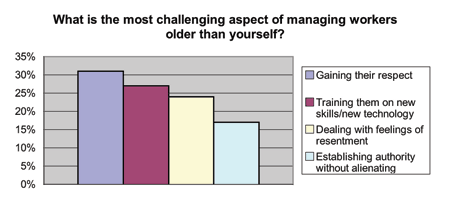By AMA Staff
In the movie In Good Company, Dennis Quaid portrays a 50-something professional salesman who suddenly finds himself reporting to a manager 25 years his junior (played by Topher Grace) after his company is bought out. An intelligent, thoughtful critique of corporate culture, the film raises many issues about the way generations interact within and outside of the workforce. It also provides an insightful look at the differences in mindset that can cause a younger manager and an older team member to clash.
One of the film’s underlying themes, for example, is Grace’s struggle to earn Quaid’s respect. The accuracy of that theme is reflected in our recent survey of Performance and Profits readers, who identified “gaining their respect” as the greatest challenge in managing older workers. One of the reasons for the lack of respect older workers feel for younger workers in general is what they perceive as a lax work ethic, according to Robert Wendover, managing director of the Center for Generational Studies in Aurora, CO.

Wendover discussed that issue and others during a recent Webcast hosted by American Management Association. The different approach to the work ethic issue, says Wendover, is “that baby boomers live to work while members of Generation X work to live.” In the case of a younger manager and an older team member, the work ethic can be particularly divisive if the team member feels like he’s working longer hours than his manager. Longer hours, however, do not necessarily equate to working harder. Wendover points out that members of Generation X tend to try to find ways to be more productive with their time so they get more work done.
One of the consequences of that philosophy, however, is that Generation X members do not socialize at the office—an important part of working life for baby boomers, according to Wendover. The boomer culture enjoys informal conversations in the workplace, while for younger generations, such conversations are time-consuming and irrelevant. “Many younger managers tend to look at their older peers and think ‘every time he calls me in the office, it means that I’m going to have to work later,” says Wendover.
He suggests that younger managers learn to value the importance of socializing as a chance to build rapport with their older colleagues and to benefit from their wisdom. Too often, fresh-minted managers disregard the insight of veterans, perhaps considering their methods and ideas outdated. That leaves those team members feeling slighted and unappreciated, and deprives the new manager of valuable business experience.
Technology also is a significant point of contention between younger managers and older team members, with the Performance and Profits survey identifying it as the second most challenging issue. Wendover says having grown up with high-tech devices, younger workers have a natural instinct for software and how technology operates, while older workers who started using technology after they’d already been in the workplace for many years aren’t quite as comfortable with it. “Older workers can look at learning software as an end in itself,” Wendover says. “Younger workers look at it as simply a tool to be used, much the same way as older workers viewed the typewriter.” Wendover suggests providing peer-to-peer training. “Someone who’s in his fifties may do a better job training someone of the same age with more patience and empathy,” he says.
Dealing with feelings of resentment—which ranked as the third most challenging issue in the survey—is a particularly emotional issue, says Wendover. “There comes a time when most older workers realize that they’ve probably gone as far as they will within the organization, or in their career,” he says. “Then someone considerably younger comes along and becomes their boss. That can be real hard.”
Wendover over stresses that empathy and effort on the part of the younger supervisor to keep these individuals motivated are key to overcoming resentment. “The older workers may not continue to rise within the organization,” he says, “but they can still make valuable contributions through special projects, training and mentoring. They are not being put out to pasture and that needs to be clearly communicated to them and others within in the work environment. The worst thing that can happen is to have co-workers writing them off.”
“Establishing authority without alienating” ranked fourth on the survey. This is a difficult feat even without generational difference, but is even trickier when team members are veterans. The key here is clear and consistent communication, says Wendover, who suggests that managers publicly address the issue on the first day.
Above all, he says, the new manager should never apologize for his or her age, no matter how challenging it gets. “Someone put you in charge,” he says. “That’s about your competence, not your age.”
About The Author(s)
American Management Association is a world leader in professional development, advancing the skills of individuals to drive business success. AMA’s approach to improving performance combines experiential learning—“learning through doing”—with opportunities for ongoing professional growth at every step of one’s career journey. AMA supports the goals of individuals and organizations through a complete range of products and services, including seminars, Webcasts and podcasts, conferences, corporate and government solutions, business books and research.